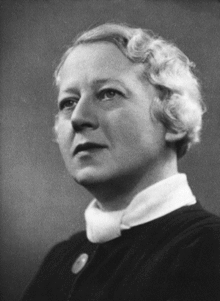Pauline Hall (composer)

Pauline Margrete Hall (2 August 1890 – 24 January 1969) was a Norwegian writer, music critic, organizer and composer. She was born in Hamar and began her study of music in Oslo, continuing in Paris from 1912–13, After completing her studies, she worked as a composer and music critic for the Oslo daily newspaper Dagbladet.[1]
Hall was known for criticism of dilettantism and superficial national composers and her promotion of modern music.[2] Hall’s debut as a composer came in 1917 with a full-length concert evening in Oslo featuring solely her works. Hall was initially known as a composer of romances, but today her orchestral works, and in particular 1929’s Verlaine Suite, stand out as centerpieces of her compositional output. French impressionism and literature would prove to be key sources of inspiration for Hall, an influx that would not necessarily resonate well with the prevailing national romanticism sentiment of 1930s Norway. Throughout her compositional career, Pall would find it challenging to introduce new stylistic impulses on the Norwegian music scene. [3]
In addition to her orchestral output, Hall also composed a number of choral works and music for stage productions. Theatre remained close to her heart, and Hall translated a number of major works into Norwegian including Igor Stravinsky’s Soldier’s Tale, Arthur Honegger’s Le Roi David and Bertolt Brecht’s The Threepenny Opera. For the latter, Hall served as the plays instructor and conductor for its 1930 Oslo premiere. [4]
In 1938 she founded Ny Musikk, the Norwegian section of the International Society for Contemporary Music and served as chairwoman.[5] She served as president of ISCM International from 1952–53, and also took over management of the ISCM International Music Festival in Oslo in 1953. Hall died in Oslo.[6][7]
Works
Hall composed orchestral works, theater and film music, chamber music and vocal works. Selected compositions include:
- 1929 Verlaine Suite, for orchestra
- 1933 Cirkusbilleder, for orchestra
- 1949 Suite av scenemusikken til «Julius Caesar» på Nationaltheateret, for orchestra
- Foxtrott, for orchestra
- 1950 Markisen, ballet, première: 1964, Oslo, Den Norske Opera
- 1947 Ro ro te rara, for male choir
- En gutt gikk ut på elskovssti, for male choir, text: Gunnar Larsen
- Nachtwandler, for 6 part mixed choir and orchestra, text: Falke
- Til kongen, for mixed choir
- To Wessel-tekster, for male choir, op. 7, text: Johan Herman Wessel
- 1945 Fangens aftensang, for voice and piano
- 1961 Fire Tosserier, for voice, clarinet, bassoon, trumpet and French horn
- Du blomst i dug, for voice and piano, text: Iens Petter Jacobsen
- Rondeau, for voice and piano, text: E. Solstad
- Tagelied, for voice and orchestra
- Tango, for voice and orchestra
- To sanger, for voice and piano, op. 4, text: Knut Hamsun Auerdahl
- 1945 Suite, for wind quintet
- Liten dansesuite, for oboe, clarinet and bassoon
Her music has been recorded and issued on CD, including:
- Pauline Hall: Verlaine Suite/Julius Caesar Suite/Suite for Winds/4 Tosserier (June 26, 2007) Simax Records/Premiere, ASIN: B000027ALU
References
- ↑ "Pauline Hall, Biography". Retrieved 20 January 2011.
- ↑ Yoell, John H. (1974). The Nordic sound: explorations into the music of Denmark, Norway.
- ↑ "Bio from record label Grappa". grappa.no. Retrieved 2017-01-12.
- ↑ "Bio from MIC Music Information Centre Norway". listento.no. Retrieved 2017-01-12.
- ↑ "Contemporary". Retrieved 20 January 2011.
- ↑ Grinde, Nils (1981). Contemporary Norwegian music, 1920-1980.
- ↑ Sadie, Julie Anne; Samuel, Rhian (1994). The Norton/Grove dictionary of women composers (Digitized online by GoogleBooks). Retrieved 4 October 2010.